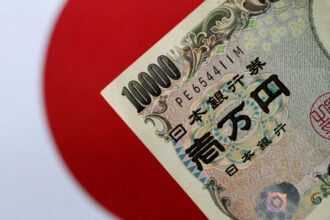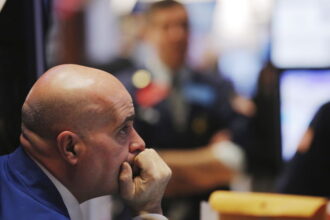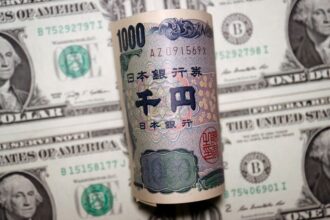Compass said that it had reached a deal to sell its Marucci Sports subsidiary to Fox Factory for $572 million.
How/Getty Images
Compass Diversified Holdings
is hitting it out of the park with a large gain on the sale of a baseball subsidiary, while the rest of its business continues to round the bases.
Compass (ticker: CODI) resembles a publicly traded private-equity fund. Its business is to buy, invest in, and eventually sell companies in a variety of industrial and consumer end markets. Its current portfolio consists of 10 businesses, engaged in selling everything from baby carriers, to crossbows for hunting, to foam packaging, to diamonds and jewelry. The group has a market value of around $1.3 billion.
On Thursday afternoon, Compass said it recorded third-quarter revenue of $570 million—down 1% year over year and about $5 million short of Wall Street analysts’ consensus estimate. The company had a net loss of $10.2 million, or 33 cents per share. Net income was $41 million after adjusting for one-time factors, including a $33 million non-cash writedown in the company’s Velocity Outdoor subsidiary.
Management’s preferred profit measure of adjusted Ebitda—short for earnings before interest, taxes, depreciation, and amortization—was $104 million in the third quarter, up 13%, versus the Wall Street consensus estimate of $100 million.
High-end jeweler Lugano Diamonds was a particular bright spot in the quarter, with adjusted Ebitda up 84% year over year, to $30 million—the highest of Compass’ 10 subsidiaries.
Management raised its full-year profit guidance on Thursday: They now expect 2023 adjusted Ebitda between $450 million and $465 million and adjusted earnings between $130 million and $137.5 million. Those are increases of $12.5 million and $11.3 million, respectively, at the midpoints.
There was more news on Thursday: Compass said that it had reached a deal to sell its Marucci Sports subsidiary, a maker of baseball bats and other equipment, to
Fox Factory
Factory Holding (FOXF) for $572 million, generating a pretax gain of around $235 million. “It really is a home run for us,” Compass CEO Elias Sabo tells Barron’s.
The company sells bats under the Marucci and Victus brands, to both professional and amateur players. Eight of the 9 batters in the Texas Rangers’ World Series-winning lineup on Wednesday night used one of Marucci’s bats. The subsidiary generated $40 million in adjusted Ebitda—up 50% year over year—on $144 million in sales in the first nine months of 2023.
It is Compass’ second sale of a subsidiary in the past year, after disposing of Advanced Circuits in the first quarter for a gain of $98 million. The company had owned the manufacturer of printed circuit boards since 2006.
Compass had a much faster turnaround with Marucci, which it acquired in 2020 for $200 million. Since then, it has invested another $70 million in the subsidiary via bolt-on acquisitions.
After taxes, minority interests, and other expenses, Compass expects to receive about $400 million in proceeds from the sale, which CFO Ryan Faulkingham says will go toward debt reduction. Compass’ leverage currently stands at 4.0 times net debt to adjusted Ebitda and should fall below 3.5 times after the Marucci deal closes. Paying down debt will save some $30 million in interest expense annually at current rates, while giving management more balance sheet capacity should opportunities arise.
“This puts us in a great opportunistic spot,” Sabo says. “It can give us the flexibility to say, maybe we should up our buyback, maybe there are attractive businesses in this environment that we should buy.”
Compass’ target companies can grow at a high-single digit to low double-digit rate annually. The firm recently added a team focused on healthcare industry investments.
At first glance, there’s not much in common between makers of baseball bats and shock absorbers. But there’s more to the coming combination than meets the eye, says Fox CEO Mike Dennison. Both are athlete-focused companies with a similar culture and highly engineered products with complex supply chains, he says.
$3.5 billion-market capitalization Fox has been on the hunt for businesses to diversify from its roots in specialized suspensions for mountain bikes, cars and trucks, and all-terrain vehicles. The company and Compass have a long history: Fox is a former subsidiary that Compass took public in 2013.
“Our basic business model is buying businesses, helping them improve, and then ultimately finding the right home for them through divestiture—there’s a point where we exhaust what we can do for a company and it might make more sense with another owner,” Sabo says. “Having owned both [Fox and Marucci,] I can say this is a really great fit.”
Compass stock has returned 2.8% including dividends year to date, although shares have been volatile, trading between roughly $17 and $23 this year. That compares with a 4% loss for the Russell 2000 index of small-cap stocks. Compass stock currently sports an annual dividend yield of 5.7%.
Write to Nicholas Jasinski at [email protected]
Read the full article here










